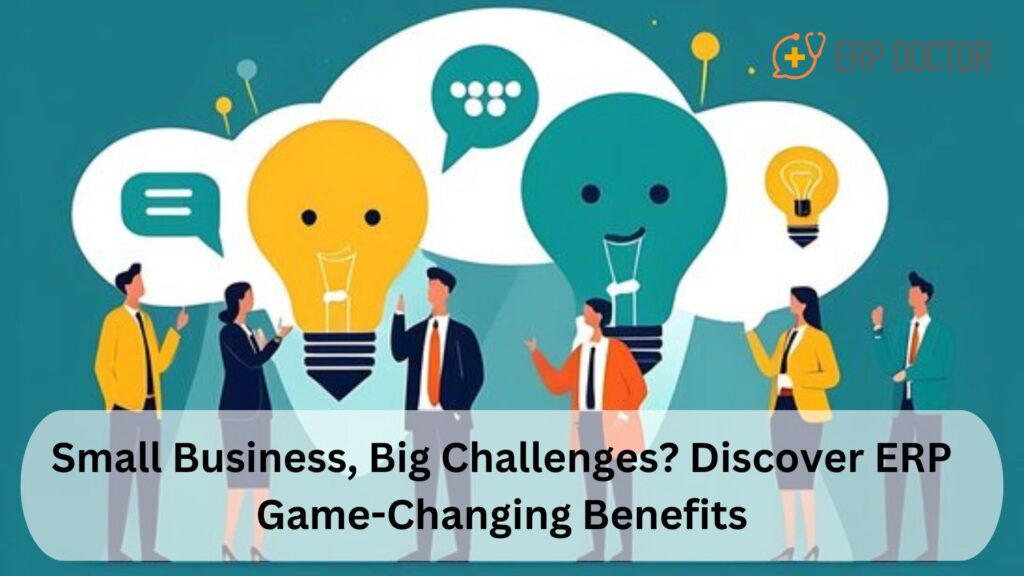
Small Business, Big Challenges? Discover ERP Game-Changing Benefits

Small Business Struggling with Growth? See How ERP Can Solve Your Biggest Challenges
Running a small business often comes with its own set of unique challenges. From managing inventory and finances to ensuring customer satisfaction, small businesses juggle a lot. But what if there was a way to streamline operations, improve efficiency, and drive growth? Enter ERP solutions—a game-changer for small businesses looking to scale and compete in today’s fast-paced market. In this blog post, we’ll explore the key benefits of ERP implementation and how these powerful systems can transform your business.
What is ERP and Why Does Your Small Business Need It?
Enterprise Resource Planning (ERP) refers to integrated software solutions designed to manage and automate core business processes. For small businesses, ERP solutions can offer centralized data, real-time insights, and seamless coordination across various departments like finance, inventory, HR, and sales.
When you implement ERP, you’re essentially equipping your business with a tool that can:
- Automate repetitive tasks
- Improve decision-making
- Increase productivity
- Enhance customer service
- Provide accurate, real-time data
In short, ERP implementation helps businesses streamline operations, reduce costs, and stay competitive.
The Top 5 ERP Benefits for Small Businesses
- Enhanced Operational Efficiency: One of the primary advantages of ERP solutions is the ability to automate routine tasks. Instead of spending valuable time manually entering data or managing spreadsheets, an ERP system centralizes your information, reducing errors and improving efficiency. Whether it’s tracking inventory levels, processing orders, or handling payroll, ERP can automate many tasks across the organization.
- Better Decision-Making with Real-Time Data: ERP solutions provide businesses with a single source of truth. With real-time data and analytics, you can access key insights into business performance, customer behavior, inventory levels, and financial health—all in one dashboard. This enables informed decision-making, helping you to quickly adapt to changes in the market and make smarter business choices.
- Improved Customer Service: With integrated CRM (Customer Relationship Management) features, ERP solutions help you better understand and engage with your customers. By having instant access to customer data, orders, and preferences, your team can respond faster and more accurately to customer queries, leading to higher satisfaction and retention rates.
- Scalability for Growth: As your small business grows, so do your needs. ERP systems are highly scalable, meaning they can grow with your business. As you expand your product offerings, services, or geographic reach, your ERP solution can be customized and upgraded to handle new requirements without missing a beat.
- Cost Reduction: ERP implementation can significantly reduce operational costs. By automating manual tasks, streamlining processes, and improving inventory management, your business can avoid costly inefficiencies and overstocking. Furthermore, ERP solutions can help with financial management by providing real-time reports, allowing you to better track expenses and identify areas where cost savings are possible.
How to Successfully Implement an ERP System
While the benefits of ERP are clear, the implementation process can be daunting. Here are a few steps to ensure a smooth transition:
- Assess Your Needs: Start by identifying your business’s key pain points. Are you struggling with inventory management? Are financial reporting and analysis a challenge? Knowing your specific requirements will help you choose the right ERP solution that fits your needs.
- Select the Right ERP Solution: Not all ERP systems are created equal. It’s essential to choose one that is tailored to small businesses and offers the flexibility to scale. Consider factors such as ease of use, industry-specific features, cloud capabilities, and cost when evaluating different options.
- Plan the Implementation: ERP implementation is a process that involves data migration, system configuration, and staff training. It’s important to set a realistic timeline and involve key stakeholders to ensure a smooth transition. Also, ensure that you have a support system in place for any technical difficulties during the rollout.
- Train Your Team: ERP systems can be complex, so investing in employee training is crucial for success. Ensure that your team is comfortable using the new system and understands how it can help them do their jobs more effectively.
- Monitor and Optimize: Once your ERP system is live, continuous monitoring and optimization are key to maximizing its potential. Regularly review system performance, gather user feedback, and make necessary adjustments to improve its functionality.
Choosing the Right ERP Solutions for Small Businesses
When selecting ERP solutions for your small business, keep these factors in mind:
- Cost-effectiveness: Look for ERP systems that fit within your budget without compromising on essential features.
- Customization: Choose an ERP solution that can be tailored to your specific industry and business needs.
- Ease of Use: A user-friendly interface is critical to ensure quick adoption by your team.
- Cloud-Based Options: Cloud ERP solutions offer flexibility, scalability, and remote accessibility.
- Customer Support: Opt for providers that offer robust customer support, including training, troubleshooting, and software updates.
Unlock the Potential of ERP for Your Small Business
Small businesses often face big challenges, but with the right tools, these obstacles can become opportunities for growth. ERP implementation offers a powerful solution to streamline processes, reduce costs, and improve decision-making. By adopting the right ERP solution, your small business can operate more efficiently, scale effectively, and provide a better experience for both your employees and customers.
Are you ready to take the next step in transforming your business? Discover the right ERP solutions today and unlock the potential for long-term success.







